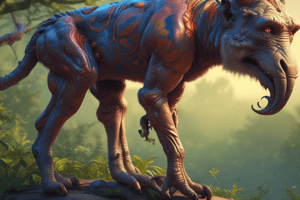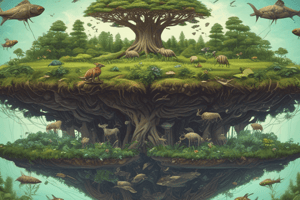Podcast
Questions and Answers
What is natural selection?
What is natural selection?
- Process that results when characteristics of a population change over generations. (correct)
- A technique for creating new species.
- A method to ensure all organisms are identical.
- A way for humans to modify traits in species.
What is selective pressure?
What is selective pressure?
An environmental condition that selects for certain characteristics in individuals.
Natural selection anticipates changes in the environment.
Natural selection anticipates changes in the environment.
False (B)
What does fitness describe in an ecological context?
What does fitness describe in an ecological context?
What is artificial selection?
What is artificial selection?
What is the key difference between natural and artificial selection?
What is the key difference between natural and artificial selection?
What are some food crops that result from artificial selection?
What are some food crops that result from artificial selection?
What is monoculture?
What is monoculture?
What are gene banks?
What are gene banks?
Flashcards are hidden until you start studying
Study Notes
Natural and Artificial Selection
-
Natural Selection: A process where population characteristics change across generations, dependent on genetic diversity within the species.
-
Selective Pressure: Influential environmental conditions, both abiotic (non-living) and biotic (living), that promote certain traits over others in individuals within a population.
-
Situational Nature of Natural Selection: Natural selection adapts organisms to changes without foresight or direction; it acts based on current environmental conditions.
-
Fitness: A measure of an individual's contribution to the next generation's gene pool, determined by their offspring's survival and reproductive success.
Artificial Selection
-
Definition and Example: A human-driven selective pressure aimed at enhancing specific traits in organisms, exemplified by selective breeding practices.
-
Natural vs. Artificial Selection: In natural selection, environmental factors drive changes, while artificial selection is influenced by human choices regarding desirable traits.
Applications and Concepts
-
Artificial Selection in Food Crops: Major food sources such as rice, corn, and wheat have been developed through selective breeding, enhancing their nutritional value and yield.
-
Monoculture: The agricultural strategy of cultivating a single crop variety over large areas, which can impact biodiversity.
-
Gene Banks: Facilities that preserve genetic diversity by storing populations of ancestral plants, ensuring their availability for future breeding needs and agricultural resilience.
Studying That Suits You
Use AI to generate personalized quizzes and flashcards to suit your learning preferences.




